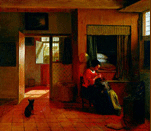










37.
The Real "Judith Shakespeares" Go Virtual:
Technology in the Teaching of Early Modern Women
Organizers:
Description:
With this workshop, the organizers seek to assemble a group of scholars to
share effective teaching practices and to establish a support network for
those interested in teaching with technology. Eventually, we hope this workshop
will lead to the spread of excellent technology-enhanced classrooms and learning
environments in which students learn about early modern women, even as we
warily consider what the relationship is and should be between feminist teaching
practices and teaching with technology.
The workshop organizers bring to the table a variety of experiences. Sheila Cavanagh regularly helps her students to become "literary professionals" by requiring them to create on-line editions that become part of Emory University's Women Writers Resource Project at the Lewis H. Beck Center (http://chaucer.library.emory.edu/wwrp/index.html). Samantha Morgan-Curtis has been able to use technology to overcome some of the difficulties of teaching at a cash-strapped state universities where many students must decide between buying textbooks and paying for food and childcare; the Web allows her classes to access texts and materials that would otherwise be off-limits because of limited funds to buy course texts. Erin Kelly has asked students to create their own electronic resources and is experimenting with using on-line resources to incorporate supplementary materials on early modern women into a traditional Introduction to Shakespeare class. All have used different educational software, including Blackboard and WebCT, and have experimented with different types of technology, including on-line video clips, synchronous messaging, and electronic drafting. While all three of us teach in departments of English, our research interests are interdisciplinary and we are particularly interested in using technology to enable students to pursue more interdisciplinary projects in our courses. Moreover, many of the issues on which we will touch will be of interest to anyone who teaches humanities courses including ways to use technology to improve writing, critical thinking, and discussion skills.
While we see how technology can enhance our teaching, we also have a number of concerns to explore with participants. Particularly for those committed to feminist pedagogy, educational technology can seem a double-edged sword. The World Wide Web has, in many ways, perpetuated the stereotypes, inequities and problems that we see in the "real world." Students who enter our classrooms with financial disadvantages or feeling they "don't belong" because of their race, gender, sexual orientation, religion or other aspects of identity can feel that mastering technology for a humanities course is too daunting a task. Better funded colleges and universities often have better electronic resources and training and technical support that may be available to faculty might be denied to adjuncts and teaching assistants. Because technical support and training is often provided by departments outside of the humanities it can be difficult to convince these "experts" of what we really need for our courses, and female instructors especially can be made to feel the technology is too difficult to learn. Still, the internet holds enormous promise for making otherwise inaccessible research materials widely and inexpensively available. It can even be argued that feminist teachers are perfectly situated to shape the ways that technology moves into our classrooms and thus to have a lasting impact on the latest innovations in pedagogical theory and practice. These are issues we hope to explore within our workshop.
As individuals register for the Attending to Early Modern Women symposium and for this workshop, they will be electronically added to an on-line "course." This on-line workshop space will enable participants to look at readings, to check out recommended websites, to post questions, to share syllabi and teaching ideas, and to participate in on-line discussions. Participants will be encouraged to share their own experiences (successes and failures, interests and anxieties) of teaching with technology. Thus, the interaction among participants we want to stress in this workshop will begin long before the conference.
The workshop for the conference itself will be held in a computer
classroom with projection capabilities so that it can include a series of
highly interactive demonstrations. These demonstrations of different ways
to use technology to teach topics related to the study of early modern women
will be developed by the organizers based on the interests and suggestions
of workshop participants. Each demonstration will be followed by on-line discussions
in different formats and by "live" face-to-face discussions. In
the workshop itself, we particularly want to focus on how one can use technology
to incorporate the study of early modern women into
a variety of types of humanities courses (on different levels, on related
subjects, general education courses, etc.) and to talk about both the benefits
and problems of teaching with technology.
After the conference, we will maintain the workshop site for
several months to facilitate collaborative work, questions, and new projects
among workshop participants. It is our hope that this workshop will create
a community of scholars interested in teaching with technology among those
committed to this symposium series' on-going project of attending to early
modern women.
Preliminary Readings:
This current list of readings gives a general idea of the types of issues we will ask participants to explore. Selections from the following texts, not totaling more than 15-20 pages of reading, will be assigned as "required reading" for participants in the months preceding the conference.
Sites for participants to evaluate and discuss:
These sites are a selection of on-line material available about the life and writings of Elizabeth Tudor. We would like participants to look at these sites and discuss them in the context of how they envision themselves teaching with technology.
These lists, available through the Society for the Study of Early Modern Women website, offer scholars invaluable suggestions about excellent resources for scholarly research, teaching, and student projects.
"Early Modern Women Database," by the Arts and Humanities Team at the Study of Early Modern Women website www.ssemw.org.
|
|
|
||||||
|
|
 |
 |
|
||||
 |
|
 |
|
||||
|
|
|
||||||
|
|
|
||||||
 |
|
||||||
|
|
|
||||||
| |
|
||||||
 |
|
||||||
 |
|
||||||
 |
|
||||||
 |
|
||||||
|
|
|
||||||
|
|
 |
|
|
||||
 |
|
||||||
|
|
|
|
|
|
|
|
|